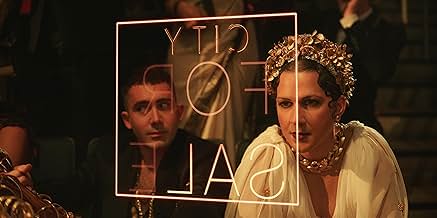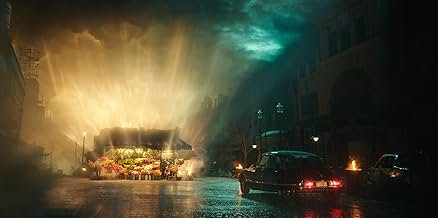Un arquitecto quiere reconstruir la ciudad de Nueva York como una utopía tras un desastre devastador.Un arquitecto quiere reconstruir la ciudad de Nueva York como una utopía tras un desastre devastador.Un arquitecto quiere reconstruir la ciudad de Nueva York como una utopía tras un desastre devastador.
- Premios
- 5 nominaciones en total
- Huey Wilkes
- (as Bailey Ives)
Argumento
¿Sabías que...?
- CuriosidadesFrancis Ford Coppola wrote the script in the early 1980s, but the film was kept on the back-burner partially due to his financial debts. Pre-production finally began in 2001 after filming 30 hours of second unit footage and holding table read with Paul Newman, Uma Thurman, Robert De Niro, James Gandolfini, Nicolas Cage, Leonardo DiCaprio, Russell Crowe, Edie Falco, and Kevin Spacey, but the project was scrapped after the September 11 attacks, because a scene from the script (page 166) "predicted" the attacks. Coppola fully abandoned the project in 2007, and didn't begin developing it again until 2019.
- PifiasAt 21:47, Julia Cicero's voice changes mid sentence: "I sent a letter to you last night. A childish letter", then it goes instantly deeper with "and I want it back before you read it" revealing ADR work.
- Citas
Cesar Catilina: *You* wanna help me?
Julia Cicero: Yeah. And, well, I... well, I want to learn.
Cesar Catilina: And you think one year of... medical school entitles you to plow through the riches of my Emersonian mind?
Julia Cicero: Entitles me?
Cesar Catilina: Yes.
Julia Cicero: [scoffs] Entitles me?
Cesar Catilina: Yeees!
Julia Cicero: Entitles me?
Cesar Catilina: YEEEEEES!
Julia Cicero: You have no idea about me! You think I am nothing, just a socialite?
Cesar Catilina: No, not nothing, but I reserve my time for people who can think. About science. And literature, and... architecture and art. You find me cruel, selfish and unfeeling? I am. I work without caring what happens to either of us. So go back to the cluuuub, bare it all, and stalk the kind of people that you enjoy.
Julia Cicero: Fine! I will.
Cesar Catilina: Come back when you have more time!
- Versiones alternativasThe "Ultimate IMAX Experience" version of the film features a live actor asking questions during the filmed press conference.
- ConexionesFeatured in Amanda the Jedi Show: MEGALOPOLIS is my Nightmare | Explained (2024)
- Banda sonoraMy Pledge
Written by Grace VanderWaal
Performed by Grace VanderWaal
Courtesy of Columbia Records
By arrangement with Sony Music Entertainment
Produced and Orchestrated by Kris Kukul
Were it not for their director's relentless passion, projects like these would go unrealized, and the world would be missing some truly great cinema. Conversely, after such a long gestation period, there is a risk that that same passion can cloud creative judgment, resulting in works that are more self-indulgent than impactful. Such is the case with Francis Ford Coppola's 'Megalopolis,' a meandering, exasperating epic that took the great director over 47 years to make.
Coppola is undeniably a filmmaking genius, however his best works were done in the 1970's and early 80's. His output has been more miss than hit since then, and his semiretirement after 1997's 'The Rainmaker' seemed to indicate that he was tired of the movie business. For years, he appeared content to relax on his vineyard, making the odd low-budget indie flick, while sporadically reediting and rereleasing his older films whenever there was a bad grape year. However, 'Megalopolis' was never far from his mind and, after falling back in love with the idea, finally began filming in 2022, nearly half a century after he first thought of it in 1977.
Entirely self-funded, it is set in the not-too-distant future in the decadent, debauched city of New Rome, centring on visionary architect Cesar Catilina, the inventor of a miraculously versatile substance called Megalon. He has a vision for the future of the city, which is at odds with that of the Mayor Franklyn Cicero. Drawing heavily on Roman history, particularly the Catilinarian conspiracy of 63 BC, the film delves into themes of societal decay, corruption and the eternal struggle between progress and regression. On paper, it sounds fascinating, especially with Coppola at the helm.
Regretfully, Coppola's execution does not match his ambition. He aims to weave a grand narrative that merges historical allegory with futuristic vision, but stumbles with his storytelling. The plot meanders, losing focus amid its myriad subplots and philosophical digressions. This lack of cohesion leaves one adrift in a sea of ideas that, while initially intriguing, do not coalesce into a compelling whole.
Furthermore, Coppola's exploration of the aforementioned themes has been seen before in countless other pictures (perhaps most obviously Fritz Lang's 'Metropolis', which came out nearly 100 years ago and still feels more relevant) making the film feel oddly hackneyed. Coppola's ideas do not feel fresh nor innovative (when they are comprehensible, that is- which they frequently aren't) and the parallels he draws between ancient Rome and society today feel ham-fisted and obvious.
Additionally, proceedings are burdened with pretentious, stilted dialogue and banal narration that sounds like the semi-coherent mumblings of a majorly stoned student minoring in philosophy. Moreover, his characters aren't compelling and the tone is all over the place, oscillating wildly between self-serious drama and unintentional comedy. This tonal inconsistency further detracts from the film's impact, leaving one unsure whether to ponder deeply or chuckle at the absurdity of it all.
Conversely, it is a stunning looking film; even though the heavy-handed CGI ranges from barely serviceable to incredibly obvious. Alongside director of photography Mihai Malaimare Jr., Coppola has crafted a world that is both striking and unsettling, blending the opulence of ancient Rome with the sleek, cold aesthetics of a futuristic utopia. Their use of light and shadow, as well as colour, creates a visual narrative arguably more compelling than the story itself.
This is compounded by Beth Mickle and Bradley Rubin's lush production design (both of whom exited the production before filming wrapped due to "creative differences"), as well as Lisa K. Sessions's intricate set decoration. Further, Milena Canonero's costume design is similarly stylish and effective, combining varying styles, contributing to the overall era-defying mise en scène.
Yet, visual splendour alone cannot save 'Megalopolis' from its narrative shortcomings. It is, quite simply put, a mess of ideas without a clear central point. The film's ambition is admirable, but feels like a collection of disjointed concepts rather than a cohesive story. Plot points aren't explored thoroughly, nor contribute to the overall narrative; namely Cesar's bizarrely inconsequential and pointless ability to stop time. Moreover, characters are introduced and discarded without much thought, leaving their arcs incomplete and unsatisfying.
Additionally, as alluded to above, Coppola's exploration of the grand themes at play, while interesting, lacks the nuanced execution seen in his earlier works. The film's philosophical digressions, rather than enriching the narrative, serve to muddle it, leaving viewers confused. Further, Osvaldo Golijov's score is unremarkable, and the lax editing ensures that it feels much longer than it is, suffering from a dearth of momentum or flow.
Despite its flaws, though, 'Megalopolis' does offer rare moments that remind one of Coppola's talent. There are scenes of breathtaking beauty and intrigue, hinting at what could have been with a more focused narrative. However, these moments are few and far between, making for an uneven glimpse into a brilliant mind rather than a fully realized masterpiece.
The performances, too, are uneven. As Cesar, Adam Driver comes across as detached from the material when he isn't grandiosely over-the-top. While Cesar is ostensibly a genius, Driver's portrayal makes him seem more like a tiresome diva than a visionary. As a central character, he lacks personality or charm, making him difficult to root for. Though he has delivered strong performances in the past, here Driver is as bland as unseasoned gruel.
As his love interest Julia, Nathalie Emmanuel, despite her best efforts, fails to create a compelling character in the face of Coppola's clichéd characterisation and weak dialogue. Similarly, Giancarlo Esposito, as Julia's father Franklyn Cicero, does not leave much of an impression. Neither of them elevates their roles beyond the superficial. One feels as if anyone could have played their roles with similar results.
Conversely, Aubrey Plaza, as the ludicrously named femme fatale reporter Wow Platinum, overcomes the terrible dialogue and cardboard-cut-out characterisation; delivering a terrific, tongue-in-cheek performance. Jon Voight seems content to overplay the role of Cesar's doddery rich uncle, while great actors like Talia Shire, Dustin Hoffman, Kathryn Hunter, Jason Schwartzman and James Remar are criminally underutilised; left with little more than nothing to do.
Additionally, Laurence Fishburne does fine work, even if his intermittent narration is so pompously portentous it sounds like he's in a Funny or Die sketch or a mockumentary. Meanwhile, as Cesar's cousin, Shia LaBeouf- who seems to be on a mission to outdo himself, giving increasingly terrible performances- is so self-indulgent, over-the-top and hammy that it's almost a parody of bad acting.
The film exemplifies the pitfalls of unchecked ambition. Without critical oversight, Coppola's vision sprawled into a self-indulgent narrative. The absence of external feedback and editorial control led to a lack of cohesion, while Coppola's reported choice to improvise scenes on the day led to ludicrous, stilted dialogue and inconsistent performances. Without anyone to tell him "No," it seems Coppola indulged in every whim and idea, no matter how tangential or underdeveloped. This means that what could have been a tight, impactful film instead became an overextended, indulgent spectacle of excess.
47 years in the making, Francis Ford Coppola's 'Megalopolis' is not in the same league as his best works. It is more akin to 'One from the Heart' or 'Twixt': a visually stunning film lacking narrative weight and cohesion. It's preachy, pontificatory pretension; a messy, bloated film failing to deliver on its grand ambitions. Although good-looking and showcasing Coppola's relentless drive and passion for cinema, if 'Megalopolis' is the future, it might be better to stay in the past.
Selecciones populares
- How long is Megalopolis?Con tecnología de Alexa
Detalles
- Fecha de lanzamiento
- País de origen
- Sitios oficiales
- Idiomas
- Títulos en diferentes países
- Megalópolis
- Localizaciones del rodaje
- Empresas productoras
- Ver más compañías en los créditos en IMDbPro
Taquilla
- Presupuesto
- 120.000.000 US$ (estimación)
- Recaudación en Estados Unidos y Canadá
- 7.629.085 US$
- Fin de semana de estreno en EE. UU. y Canadá
- 4.007.797 US$
- 29 sept 2024
- Recaudación en todo el mundo
- 13.858.876 US$
- Duración2 horas 18 minutos
- Color
- Mezcla de sonido
- Relación de aspecto
- 2.00 : 1
Contribuir a esta página










































